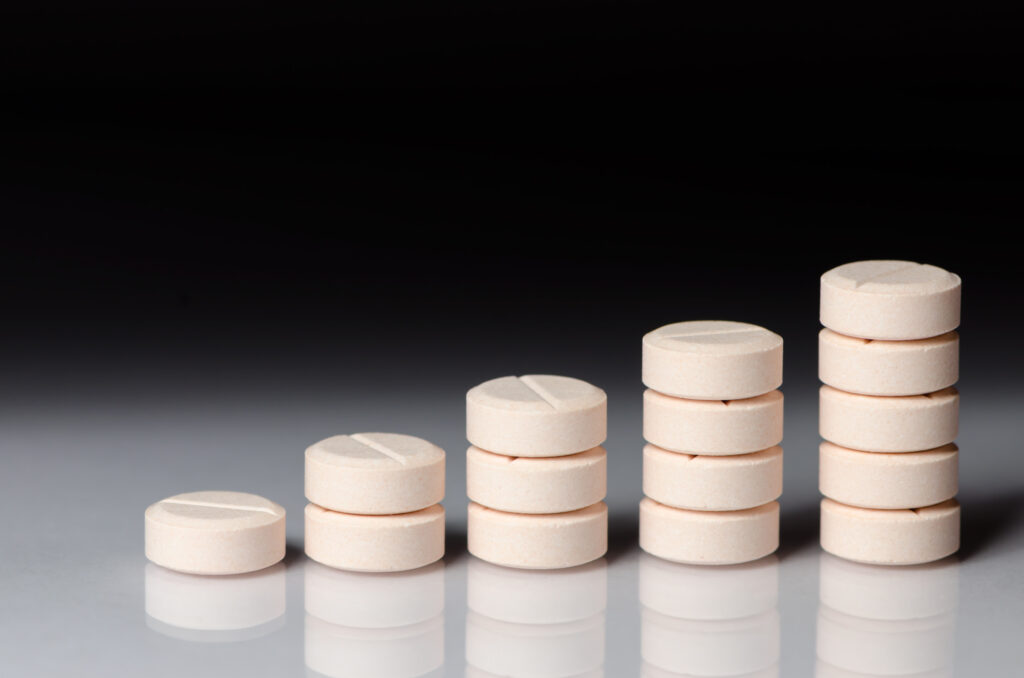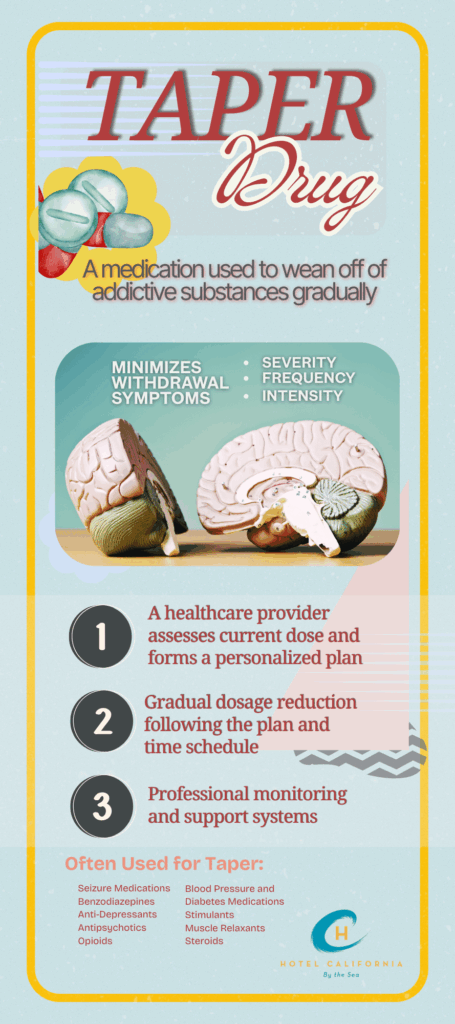What is a Taper Drug?
A taper drug is a medication used to gradually wean someone off an addictive substance such as opioids or benzos. Some substances can be so addictive that quitting cold turkey can lead to dangerous withdrawal symptoms. These drugs need to be tapered. Drug tapering is a process in which the patient will gradually reduce the dosage of the substance or drug over a set period of time.

Drug tapering is the gradual reduction of an addictive substance to give the body ample time to readjust as the body becomes accustomed to lower levels of the drug. It helps people to discontinue the use of addictive drugs that can cause serious and uncomfortable withdrawal symptoms when drug use has suddenly stopped or has been abruptly reduced.
Drug tapering can make the process of coming off an addictive medication easier to manage because it helps to lessen the severity and intensity of withdrawal symptoms. Some common medications used during tapering include anti-nausea medications, sleep aids and medications to help manage anxiety and depression. Most medications used during tapers are to manage specific symptoms of withdrawal.
Factors that can impact your withdrawal from an addictive substance
- Type of drug used – some drugs take longer to withdraw from than others
- Dependence level – the more severe the dependence, the longer the taper process may take
- Overall health – people who have underlying conditions require a slower taper process to minimize extra stress on the body
- Individual response – every person’s body responds differently and each taper should be individualized
Why is it important to taper off a substance?
Prescription painkillers, synthetic opioids, and benzodiazepines are very addictive drugs that require a gradual taper to end drug use. Because of its potent nature, some of the long-term effects users can be at an increased risk of are dangerous.
- Opioid induced hyperalgesia – a condition resulting in abnormal pain and sensitivity due to long-term opioid use
- Physical dependence
- Constipation and nausea
- Drowsiness and fatigue
- Depressed mood
- Sleep apnea
- Lowered testosterone
- Low estrogen
- Respiratory issues
Tapering off an addictive medication can help to minimize withdrawal symptoms, whether it is through minimizing intensity, minimizing severity or minimizing frequency of symptoms. It can improve the chances of recovery success and increase the likelihood that a person will successfully discontinue using the drug. Sometimes drug use can be so intense it can lead to relapse. Tapering medications can help lower the risk of relapse. Overall, tapering reduces the risk of complications when detoxing from an addictive substance.

Taper medication
When it comes to opioid use disorder treatment, a taper commonly used medication is methadone. Methadone is a synthetic opioid that lasts much longer in the body compared to other opioids. It is not as potent as other opioids and because it is longer-lasting, users do not take as many or as high a dose. Using this as a taper medication can allow the body to gradually adjust to opioids while still providing the drug without the euphoric effects.
Medications or drugs that require Drug Tapering
- Benzodiazepines – Benzos are central nervous system depressants that are commonly prescribed to treat anxiety, sleep disorders and panic disorders. They are very powerful and when taken long term, can lead to dependence and withdrawal symptoms. The withdrawal symptoms can be very intense and sometimes life-threatening. Seizures are one of the biggest dangers of benzo withdrawal.
- Anti-depressants – Anti-depressant drugs impact your central nervous system. SSRIs and SNRIs are typically not considered addictive drugs. However, you can still develop a psychological dependence that causes withdrawal symptoms. When your brain doesn’t have time to adjust, it can lead to the development of severe mood swings, irritability, insomnia and seizures.
- Opioids – Prescription painkillers and synthetic opioids like heroin are powerful pain relievers that can lead to tolerance and dependence. These central nervous system depressants are very addictive and need to be gradually tapered off.
- Antipsychotics – Antipsychotics are usually used to treat schizophrenia and bipolar disorder. Tapering off these medications can help a patient remain stabilized because they do cause withdrawal symptoms.
- Seizure medications – These types of medications are meant to protect you from seizures and when you suddenly stop using them, it will increase the risk of having one. These medications can include Topiramate and gabapentin.
- Stimulants – Prescription stimulant drugs like Ritalin and Adderall are used to treat conditions of ADHD. When suddenly stopping these medications, it can lead to side effects such as fatigue, difficulty concentrating and impaired cognitive functions.
- Blood pressure medications and blood thinners – These types of medications control blood pressure or help to prevent blood clots. Medications include propranolol, beta blockers, losartan and other blood pressure meds. These help slow down your heart rate to prevent it from pumping too hard. This is important for heart health and the prevention of stroke. They can also prevent the body from holding on to salt and extra water, taking the strain away from the heart and kidneys. A sudden increase in blood pressure when you stop taking the medication can lead to a heart attack.
- Muscle relaxants – Medications like Baclofen help treat spasms and muscle pain. Withdrawal from muscle relaxants can include fever, weakness and worsening muscle pain.
- Steroids – Corticosteroids like prednisone suppress the body’s natural production of cortisol. A gradual taper is recommended for coming off steroids to help the body adjust and resume proper functioning.
- Diabetes medication – These types of medications are used to help control your blood sugar levels. If you suddenly stop taking them, it can cause a spike in blood glucose, causing a new set of problems.
Check Your Insurance Coverage for FREE
Find out if your insurance covers addiction treatment in minutes. We accept most insurance!
Types of Tapering Methods
Direct tapering. Direct tapering is the most common type of taper method. It involves gradually decreasing the dose of the original drug you have become addicted to. The gradual decrease can be daily, weekly or monthly.
Substitution tapering. This type of tapering involves switching to a longer-acting drug in the same class to gradually taper off that medication. This helps to keep the patient stabilized and reduce withdrawal symptoms. This method is often used when the drug you are trying to detox from is a short-acting drug with a shorter half-life.
Titration tapering. This type of tapering adjusts the dose of your medication based on your individual response to withdrawal symptoms.
Fast tapering. Fast tapering decreases the total daily dose of the drug by 20-25% every few days to help minimize withdrawal symptoms. It involves shorter intervals of time or a higher percentage of decreased medication. This can cause severe withdrawal symptoms so close monitoring is required when considering fast tapering.
Slow tapering. Slow tapering involves decreasing the daily dose by 10-25% every 1-3 weeks. Once the patient is on the lowest dose, the frequency of use will then begin to decrease until they are no longer on the medication.
How to Taper off Addictive Substances
The first step in tapering off a drug is the assessment process. The clinical provider or healthcare provider will assess your current dose, frequency of use, health status and medical history. This will help them develop a personalized plan for a gradual taper and detox from the substance.
Next, your dosage will be gradually reduced over a predetermined period of time. The tapering schedule will vary depending on the type of substance you were using and your individual dependence level on the drug. Gradual reduction will come in stages.
Regular monitoring by a professional healthcare provider is very important. Having regular check-ups can help the patient effectively manage withdrawal symptoms that may occur.
Having a strong support system of friends and family will also help improve the chances of success. Consider joining a support group, going to therapy to speak to a professional or talking to friends and family you trust and rely on. These are all forms of a support system that can help you emotionally get through detoxing and withdrawing from an addictive substance.
Reach out to Hotel California by the Sea
We specialize in treating addiction and other co-occurring disorders, such as PTSD. Our Admissions specialists are available to walk you through the best options for treating your addiction.
Treatment for Substance Use Disorder
Substances like opioids and benzos can be very addictive and cause uncomfortable withdrawal symptoms. In order to avoid these during detox and coming off these substances, the taper method is the most recommended and safest way to stop using the substance. Tapering is a method of gradual substance reduction that is usually offered in professional behavioral treatment programs.
Hotel California by the Sea provides professional treatment programs to help people with substance use disorders. We offer treatment at all levels of care including detox, residential, PHP and IOP. We utilize evidence-based treatment methods including CBT, DBT and EMDR therapy. Hotel California is dedicated to helping clients reach their goals in sobriety and overcome their addiction.
References:
https://www.addictioncenter.com/treatment/drug-tapering
https://www.hss.edu/health-library/conditions-and-treatments/patient-guide-opioid-tapering
https://www.goodrx.com/drugs/side-effects/dangerous-medications-to-stop-abruptly
